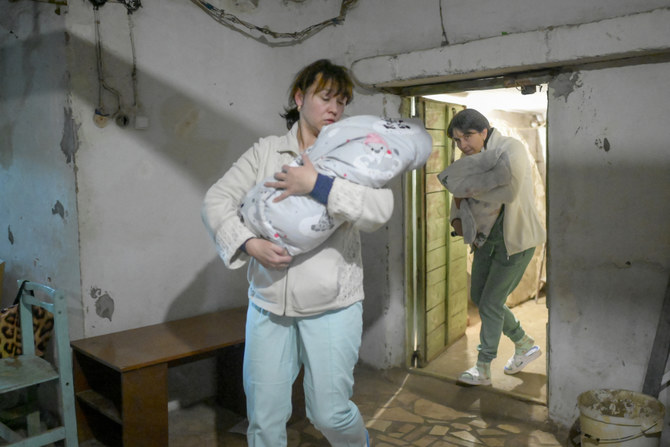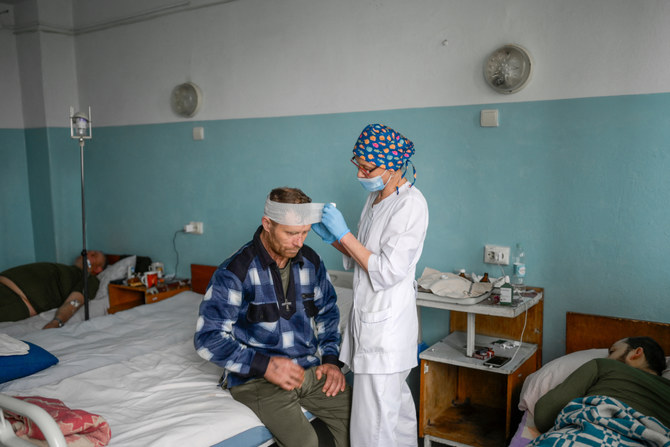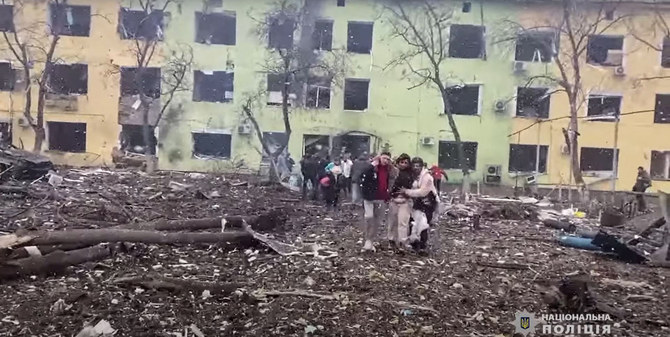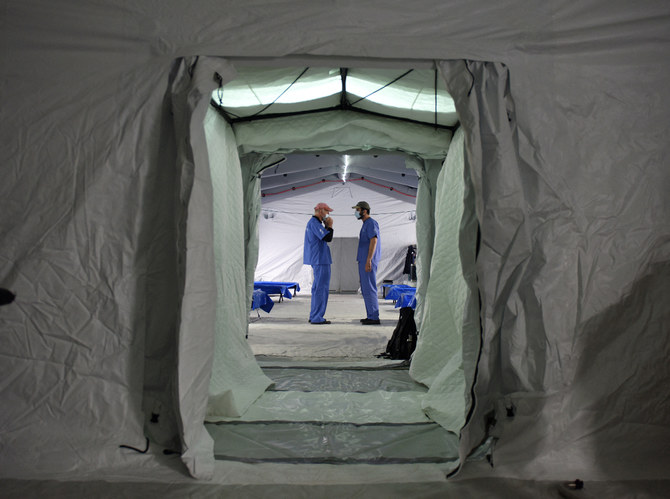JEDDAH: Almost overnight, the war in Ukraine has compelled doctors and medics to become almost superhuman, forced to care for the sick, the elderly and the wounded who are in no position to flee the war-torn country, as health facilities come under air and artillery attack.
Since the start of Russia’s invasion of Ukraine on Feb. 24, some 43 assaults on health facilities have been documented by the World Health Organization’s Surveillance System for Attacks on Health Care.
In 24 of the reported attacks, health facilities were either damaged or completely destroyed, while in five cases ambulances were hit. A total of 12 people were killed and 34 injured in these attacks, but aid agencies fear the nationwide toll is far higher.
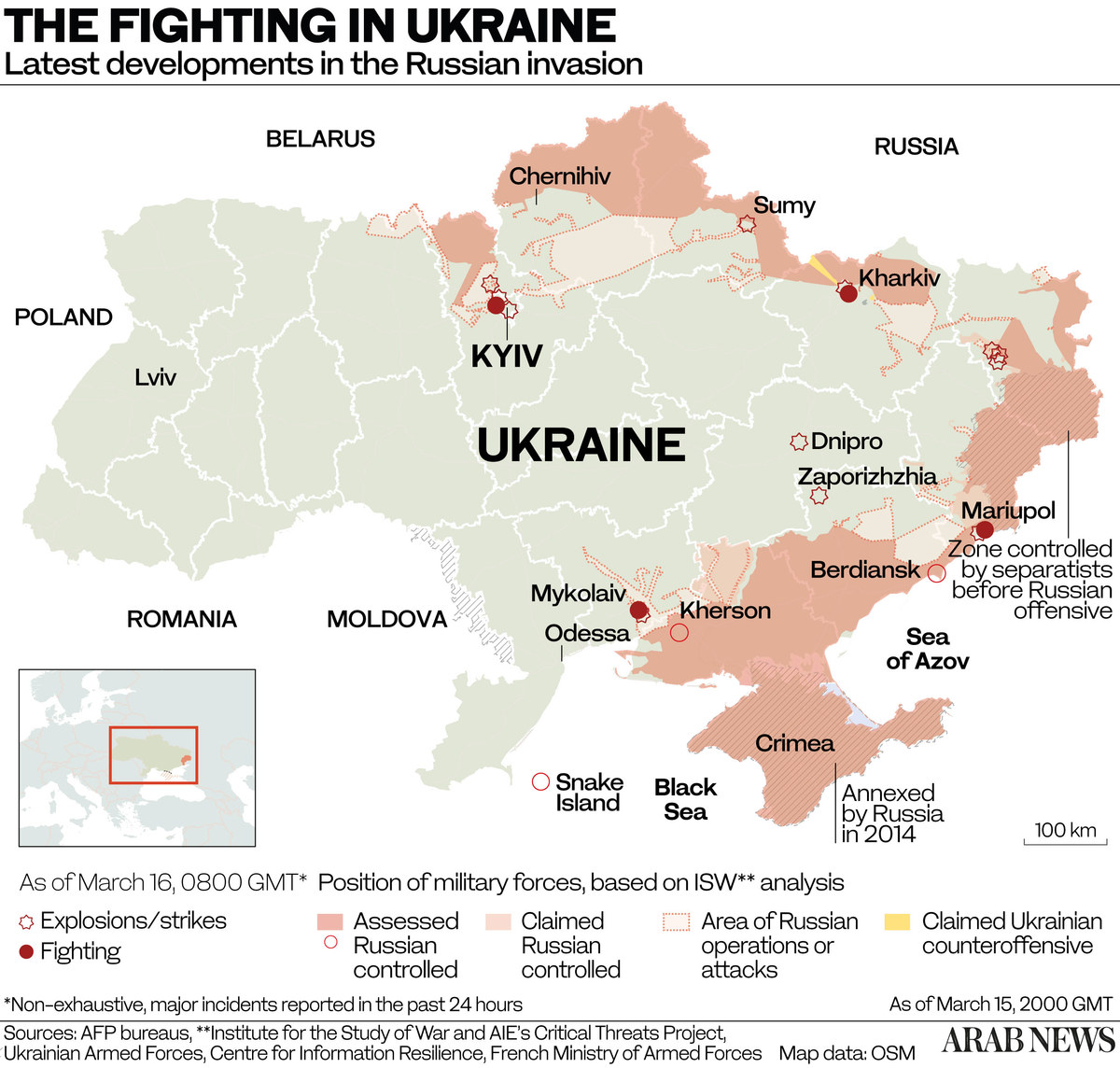
“WHO strongly condemns acts of violence against health care,” the UN agency said in a statement on March 14. “Every single attack deprives people of life-saving services. Attacks on health care are violations of international humanitarian law and human rights.”
Disruption to trade and distribution has meant that oxygen, insulin, surgical supplies, anesthetics, transfusion kits and other medical supplies, including those for the management of pregnancy complications, are already running dangerously low across Ukraine.
“Supply chains have been severely disrupted,” the WHO said. “Many distributors are not operational, some stockpiles are inaccessible due to military operations, medical supplies are running low, and hospitals are struggling to provide care to the sick and wounded.”
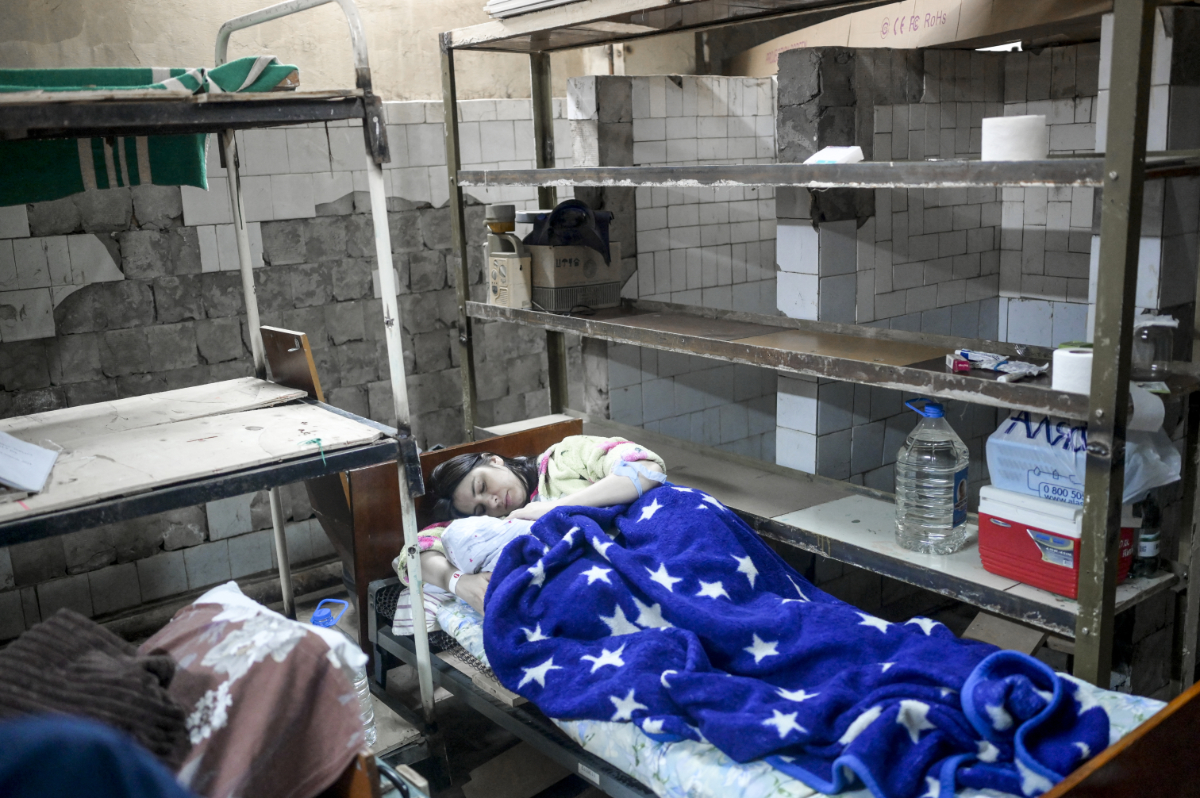
With maternity hospitals targeted by Russian forces, and maternity wards turned over to treating casualties, expectant and new mothers and their babies in Ukraine are especially vulnerable. (AFP)
The deterioration of health infrastructure has also led to mounting concerns about hypothermia, frostbite and respiratory diseases in the extreme cold. Alarm bells are also ringing for mental health issues, and a lack of treatment for chronic conditions such as cardiovascular disease, diabetes and cancers.
“Faced with this grim and escalating crisis, we are mobilizing a massive relief effort,” said Martin Griffiths, the UN’s under-secretary-general for humanitarian affairs and emergency relief, while announcing a $40 million fund on March 14 to support aid agencies.
The scene is, unfortunately, all too familiar. Burning buildings, people packed in bomb shelters for safety, the injured carried off by paramedics, and the deceased covered by pieces of cardboard waiting to be transferred to a morgue to be identified by their next of kin.

Children displaced from Ukraine play at charity center in Siret, Romania, on March 16, 2022. (Clodagh Kilcoyne / REUTERS)
“WHO is doing everything it its power to support the heroic health workers in Ukraine and to sustain and preserve the health system so that it may serve the people of Ukraine,” Alona Roshchenko, a spokesperson for the WHO country office in Ukraine, told Arab News.
“To do that, WHO and its partners need further financial support. We need $57.2 million to provide essential health services, including trauma care, for 6 million people for the next three months, but our emergency appeal for Ukraine and neighboring countries is only 5.2 percent funded so far.”
In a joint statement issued on March 13, the WHO, the UN Children’s Fund and the UN Population Fund called for an immediate ceasefire and an end to attacks on healthcare professionals and facilities in Ukraine.
“To attack the most vulnerable — babies, children, pregnant women and those already suffering from illness and disease, and health workers risking their own lives to save lives — is an act of unconscionable cruelty,” they said.
Possibly the most shocking images to emerge from Ukraine in recent days were those depicting the appalling aftermath of a missile strike on a maternity hospital in the besieged southern port city of Mariupol on March 9.
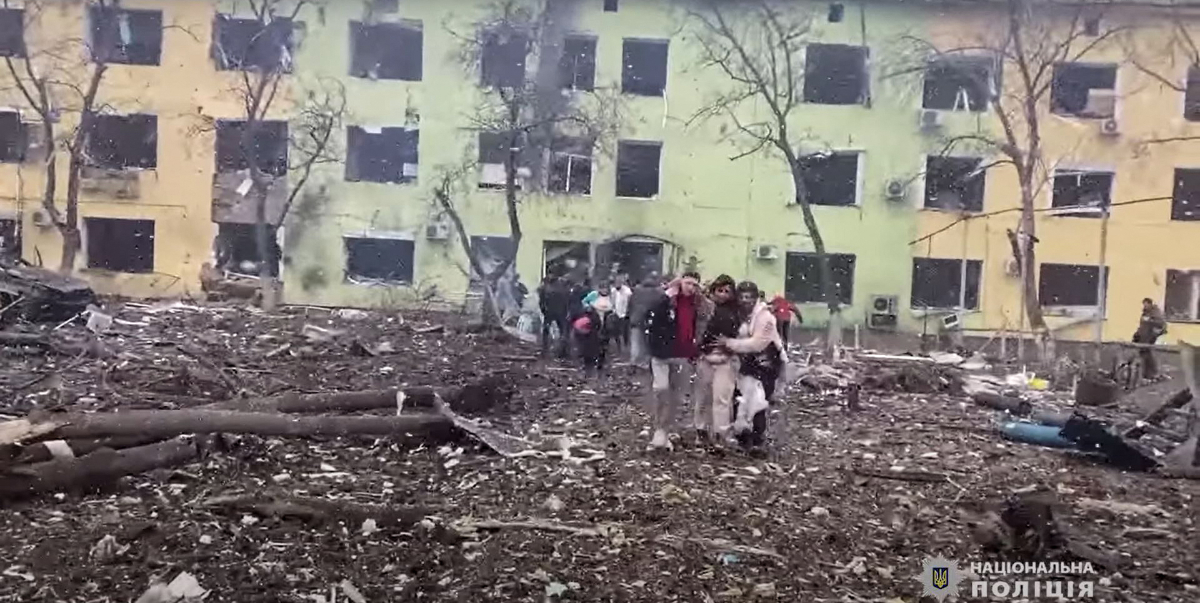
A Ukrainian man injured during Russian attack receives treatment in the central hospital of Mykolaiv, western Ukraine on March 8, 2022. (Videograb from police handout/AFP)
At least three people were killed in that attack, including a young girl, while another pregnant woman wounded in the attack died along with her baby on March 14. Photographs of the women being stretchered out of the ruins have become emblematic of the war’s brutal toll on civilians.
According to UNFPA, the UN’s reproductive health agency, two other Ukrainian maternity hospitals had already been attacked and destroyed before that strike.
Nestled on the outskirts of Kyiv, Leleka Maternity Hospital provides the best birthing experience to expectant mothers. Today, the maternity hospital is a general hospital treating wounded soldiers while providing urgent obstetric care.
“It’s really hard to understand what’s going on in Kyiv now,” Vadim Zukin, COO of Lela Maternity Hospital, told Arab News. “Personally, I have never imagined this could be a reality in Europe. Such pictures I’ve seen only in the movies before.”
Dr. Paulouski Maksim, head of the cardiac anaesthesias department, ICU and ECLS department at Feofaniya Clinical Hospital in Kyiv, told Arab News the facility has struggled to maintain oxygen and blood supplies.
IN NUMBERS
36 tons - Vital medical supplies that have reached Lviv (WHO).
10 tons - Trauma and emergency surgery kits that have reached Kyiv (WHO).
$40 million - allocated from the Central Emergency Fund to enhance aid agencies’ efforts.
6.7 million - Ukrainians internally displaced.
2.8 million - Ukrainians who have crossed into neighboring countries.
“We have problems with fibrinogen concentrate, a human blood coagulation factor to treat acute bleeding episodes, and cryoprecipitate, a frozen blood product prepared from blood plasma,” he said.
“Consumables for thromboelastography, a method for testing blood coagulation, have also run out. There are not enough systems for rapid infusion. Ukrainian hospitals need equipment and medicines. Antibiotics, hemostatics, blood preparation equipment.”
Patients at the National Children’s Hospital Ohmatdyt, the largest children’s hospital in Ukraine, located near central Kyiv, awoke last week to the sound of intense shelling.
According to Dr. Serhyi Chernyshuk, medical director at Ohmatdyt, many of the women, children and elderly patients have already been evacuated to safer areas in the west of the country to make way for the war-wounded.
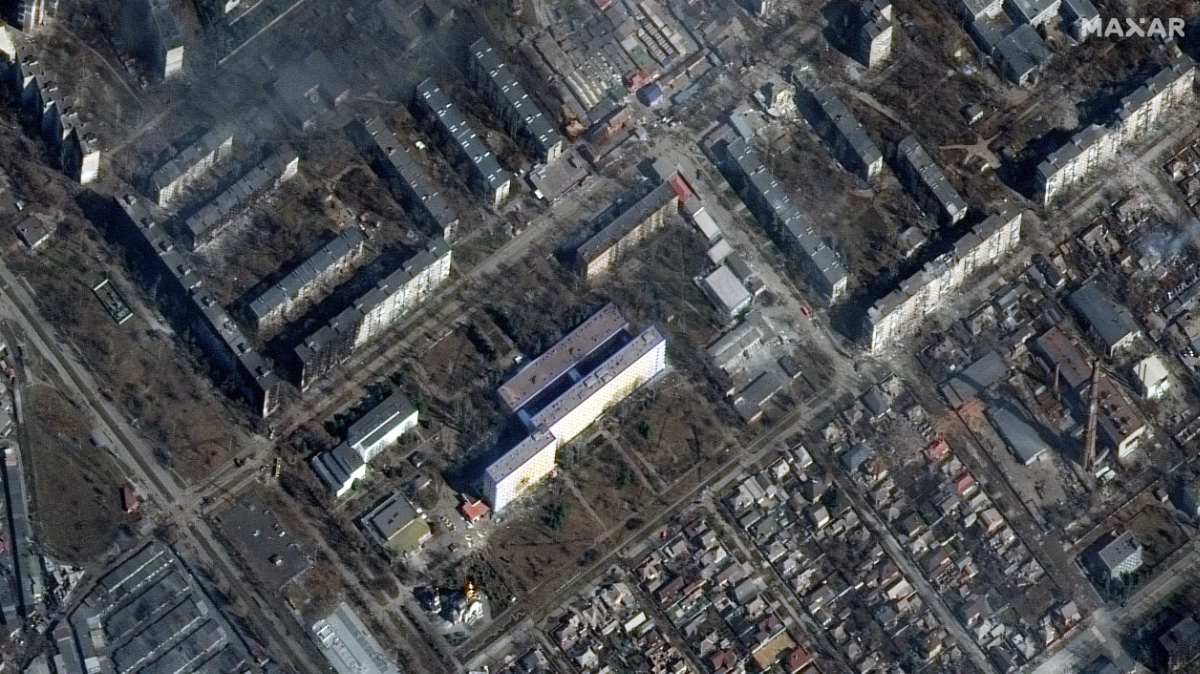
This satellite image taken on March 14, 2022 shows a hospital and apartment buildings destroyed during a Russian air barrage in Mariupol, Ukraine. (Maxar Technologies / AFP)
“We started treating injuries caused by combat actions including adults, many of our patients and staff staying in the basement continuously and medical supplies are available,” said Chernyshuk.
“If the situation gets worse, we’re going to have to evacuate patients through organizations if at least one way from Kyiv is open to the western part of Ukraine and abroad if necessary,” he said.
What was once a hospital treating 600 in-patients and 1,000 out-patients per day has now moved most of its consultations online for patients’ safety, restricting physical visits to just 200 per day.
Dr. Lesia Lysytsia, an ophthalmologist at Ohmatdyt, has been staying at the hospital with her husband and their two young daughters. “Treating patients under a stressful situation is something unknown to us,” Lysytsia told Arab News.
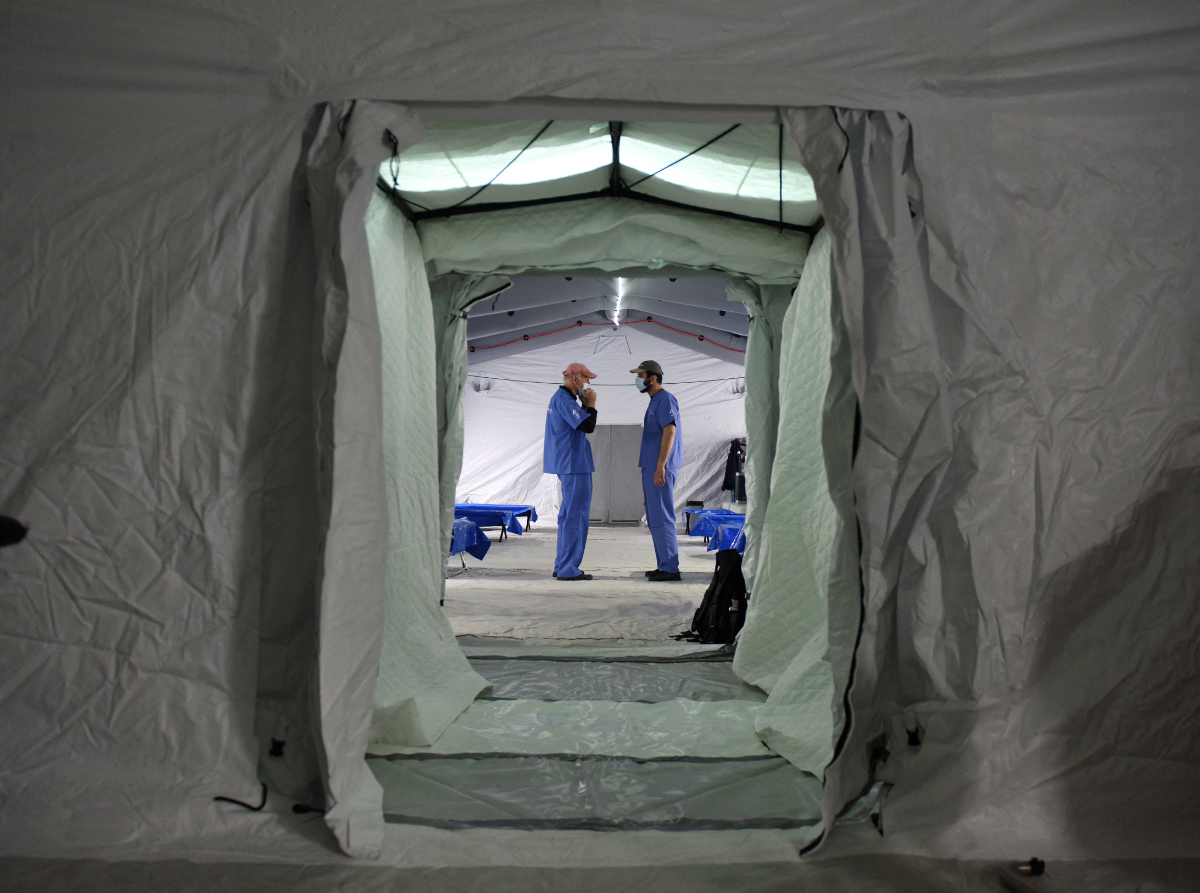
This picture shows a field hospital set up by the US relief group Samaritan's Purse at an underground parking lot of a shopping mall in Sokilnyky, western Ukraine. (Yuriy Dyachyshyn / AFP)
“We’ve evacuated all patients from Kharkiv, Mykolaiv, Mariupol and Cherniv. Some patients were also evacuated from Kyiv to Lviv and were met by doctors at the border to check their situation, give patients supplies if necessary, before they move to Poland, where they’re met by doctors from St. Jude’s Hospital,” she said.
“It’s impossible to evacuate everyone and send them off to Europe. This is the most difficult part and tough decisions have to be made.”
Moscow says its “special military operation” in Ukraine is aimed at protecting Russia’s security and that of Russian-speaking people in the eastern Donbass region. Western nations have accused Russia of invading a sovereign country and of committing war crimes.
Almost 3.5 million people have crossed into neighboring countries since the invasion began — the majority heading west into Poland — resulting in the fastest growing refugee crisis in Europe since the Second World War.
Ukrainian men between 18 and 60 are prohibited from leaving the country, which means those crossing into neighboring countries are predominantly women, children, older people and those living with disabilities, according to the International Committee of the Red Cross.
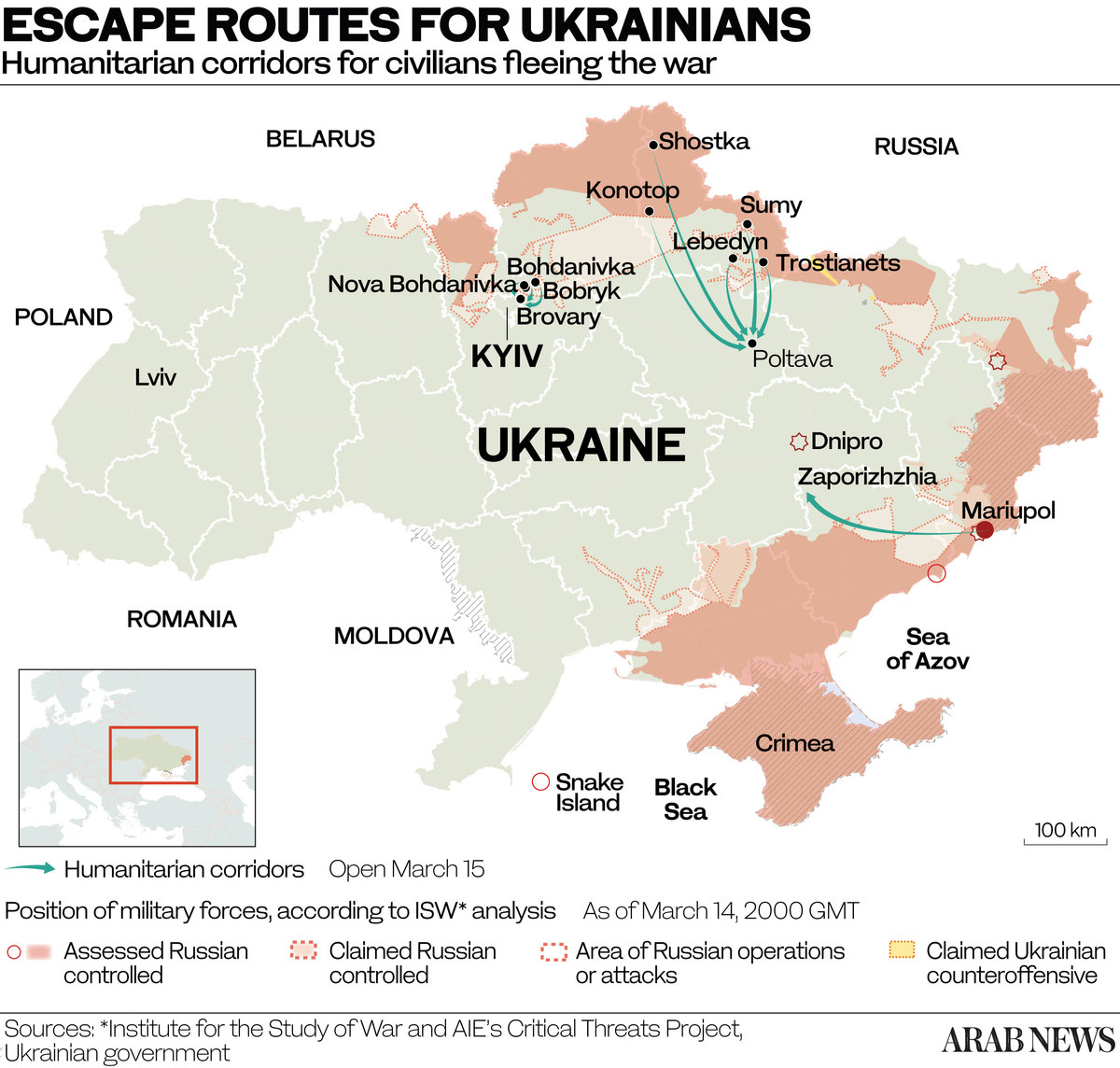
“Providing aid is putting bandages on mortal wounds right now,” said Roshchenko of the WHO country office. “Violent conflict is driving the health and humanitarian crisis, which will not stop unless there is a ceasefire and peace.”


